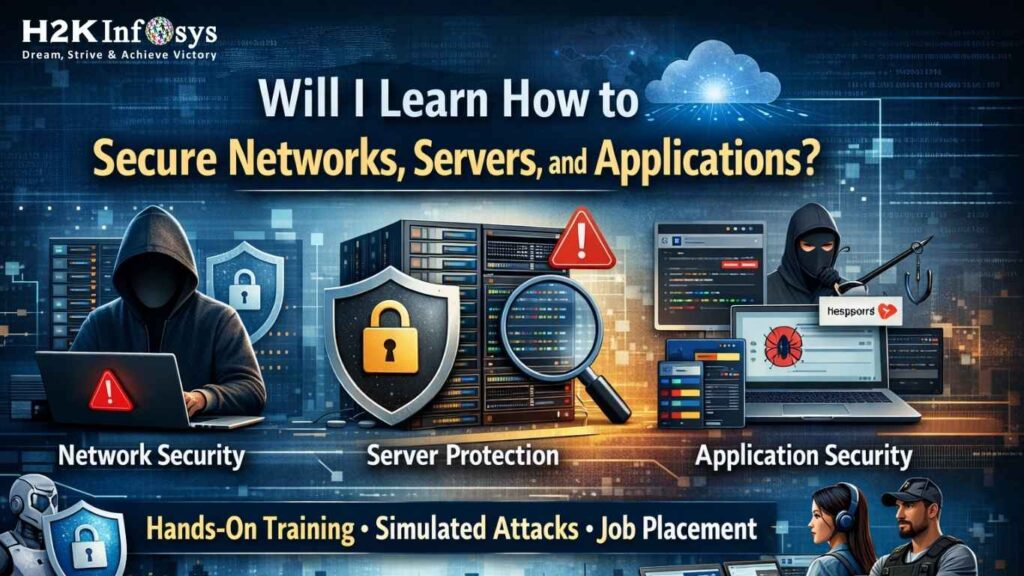Introduction: Why Ethical Hacking Test Questions Matter
In an increasingly digital world, organizations are under constant threat from cybercriminals. From data breaches to ransomware attacks, the dangers are real, persistent, and evolving. To counter these threats, companies hire ethical hackers—professionals trained to think like attackers but act within legal and professional boundaries.
To become an ethical hacker, you must go beyond theoretical knowledge. You must understand how attackers operate and how to defend against them. That’s where Ethical Hacking Test Questions come in. These questions are not just for exams—they train your mind to recognize vulnerabilities, apply cybersecurity techniques, and stay current in a fast-paced industry.
If you are considering a Cyber security course with placement or actively seeking cyber security training near me, mastering these test questions is a critical step toward career success.
What Are Ethical Hacking Test Questions?
Ethical Hacking Test Questions are practice scenarios that simulate real-world cybersecurity problems. They are used in:
- Certification exams (CEH, OSCP, Security+)
- Technical interviews
- Cybersecurity bootcamps
- Cyber security training and placement programs
These questions cover a wide range of topics:
- Reconnaissance
- Network scanning
- Exploitation
- Post-exploitation
- Vulnerability analysis
- Web application security
At H2K Infosys, students practice Ethical Hacking Test Questions during their hands-on labs, ensuring they are job-ready and certification-ready.

Essential Ethical Hacking Test Questions (With Explanations)
Let’s review some foundational Ethical Hacking Test Questions to help you get started.
Question 1: What are the phases of ethical hacking?
Answer:
- Reconnaissance
- Scanning
- Gaining Access
- Maintaining Access
- Covering Tracks
Each phase is critical to understanding the attacker’s lifecycle. These concepts are core to most cyber security training courses.
Question 2: What is SQL Injection, and how can it be prevented?
Answer:
SQL Injection is a technique where attackers insert malicious SQL statements into input fields. This can lead to data leakage or unauthorized access.
Prevention:
- Use parameterized queries
- Sanitize inputs
- Disable unnecessary database permissions
Cybersecurity training and placement modules at H2K Infosys include hands-on labs for SQL injection testing.
Question 3: What tool would you use for network mapping?
Answer:
Nmap is widely used for network discovery, port scanning, and vulnerability detection. It’s frequently tested in Ethical Hacking Test Questions because of its flexibility and effectiveness.
Question 4: What is footprinting?
Answer:
Footprinting is gathering data about a target before launching an attack. It can be active or passive and is the first step in the hacking process.
Example: WHOIS lookup, search engine queries, and social media analysis.
Note: Most cyber security training and placement curricula emphasize reconnaissance tools during practice labs.
Intermediate Ethical Hacking Test Questions
As you progress in your learning, you’ll face more nuanced questions. Here are examples of Ethical Hacking Test Questions that test deeper technical knowledge.
Question 5: Explain ARP spoofing.
Answer:
ARP spoofing tricks the target device into associating the attacker’s MAC address with a legitimate IP address. This allows intercepting or modifying traffic.
Countermeasures:
- Static ARP entries
- Packet filtering
- Dynamic ARP inspection
These topics are integral to cyber security training courses offered by H2K Infosys.
Question 6: What’s the difference between vulnerability assessment and penetration testing?
Answer:
- Vulnerability assessment identifies potential weaknesses.
- Penetration testing actively exploits them to gauge risk.
Understanding this distinction is key for answering advanced Ethical Hacking Test Questions and for performing real-world testing scenarios.
Question 7: What is Metasploit used for?
Answer:
Metasploit is a framework for developing and executing exploit code. It is often used in Ethical Hacking Test Questions related to exploitation and payload delivery.
Common Use Case: Exploiting unpatched systems with pre-built modules.
Real-World Applications of Ethical Hacking Test Questions
Ethical Hacking Test Questions go beyond academic exercises. In H2K Infosys’s cyber security course and job placement program, learners apply these questions in simulated environments to mimic real-world attacks.
Example Scenario:
Question: A company reports unauthorized access to sensitive employee data. How would you simulate and analyze the breach?
Expected Answer:
- Perform a risk assessment
- Use Nmap to identify vulnerable services
- Exploit weak points using Metasploit
- Analyze logs using Wireshark
- Prepare a report suggesting mitigation
Practicing questions like these prepares students for both job interviews and day-to-day professional responsibilities.
Popular Tools You Must Know
Every ethical hacker must be comfortable with the essential tools featured in Ethical Hacking Test Questions.
| Tool | Purpose |
| Nmap | Network scanning |
| Wireshark | Packet analysis |
| Metasploit | Exploitation framework |
| Burp Suite | Web app testing |
| John the Ripper | Password cracking |
| Aircrack-ng | Wireless network attacks |
H2K Infosys ensures hands-on exposure to all major tools as part of its cyber security training and placement curriculum.
Certifications That Use Ethical Hacking Test Questions
Preparing for certifications? You’ll encounter Ethical Hacking Test Questions in exams such as:
- Certified Ethical Hacker (CEH): Industry-standard credential with scenario-based questions.
- CompTIA PenTest+: Hands-on penetration testing tasks.
- OSCP: Advanced, real-time exploitation tasks.
- Security+: Beginner-level test including foundational concepts.
Through H2K Infosys’s cyber security course with placement, learners prepare for these exams using practical assignments and simulated tests.
Practice Questions for Daily Review
Here are a few more Ethical Hacking Test Questions to keep your skills sharp:
Question 8: What is Cross-Site Scripting (XSS)?
Answer:
XSS allows attackers to inject scripts into webpages viewed by others. This can lead to session hijacking or data theft.
Question 9: How can you secure a wireless network?
Answer:
- Use WPA3 encryption
- Disable SSID broadcasting
- Implement MAC filtering
- Change default router credentials
These basic security principles are frequently tested in Cybersecurity training and placement evaluations.
Question 10: What is the purpose of a honeypot?
Answer:
A honeypot is a decoy system set up to lure attackers and study their methods. It’s an advanced defensive strategy covered in ethical hacking.

Career Outlook and Demand for Ethical Hackers
With organizations experiencing an increase in cyber threats, the need for skilled ethical hackers is rising.
Key Stats:
- Global cybersecurity spending is projected to exceed $188 billion by 2025.
- Over 3.5 million cybersecurity jobs will go unfilled worldwide.
- Ethical hackers are in demand across the government, banking, healthcare, and IT sectors.
By practicing Ethical Hacking Test Questions, learners develop the skills and confidence to pursue high-paying, stable roles through cyber security course and job placement programs.
Why Choose H2K Infosys for Ethical Hacking Training?
H2K Infosys provides comprehensive cyber security training courses designed to prepare you for a career in ethical hacking. Here’s what sets us apart:
- Real-time hands-on lab experience
- 1:1 mentorship for certification prep
- Mock interviews and job readiness sessions
- Live classes with expert instructors
- Career-focused cyber security training and placement support
Our programs cover hundreds of Ethical Hacking Test Questions to help learners build strong foundational and advanced hacking knowledge.
Conclusion: Master Ethical Hacking Test Questions with H2K Infosys
The journey to becoming a skilled ethical hacker begins with understanding and mastering Ethical Hacking Test Questions. These questions prepare you for certifications, interviews, and job success. They sharpen your analytical thinking, expose you to real-world attack strategies, and strengthen your defense tactics.
Enroll now in H2K Infosys’s Cyber security training and placement program. Get certified, gain hands-on experience, and build a future-proof career in cybersecurity.
Key Takeaways
- Ethical Hacking Test Questions are essential for cybersecurity training, certifications, and job readiness.
- Practice regularly to stay sharp and up-to-date.
- Use tools like Nmap, Wireshark, and Metasploit.
- Enroll in a cyber security course with placement to gain practical experience.
- Choose H2K Infosys to get real-world training and placement support.



























2 Responses
Maciofonespyrix at gma1l com are ethical! Thanks to anonymous hackers